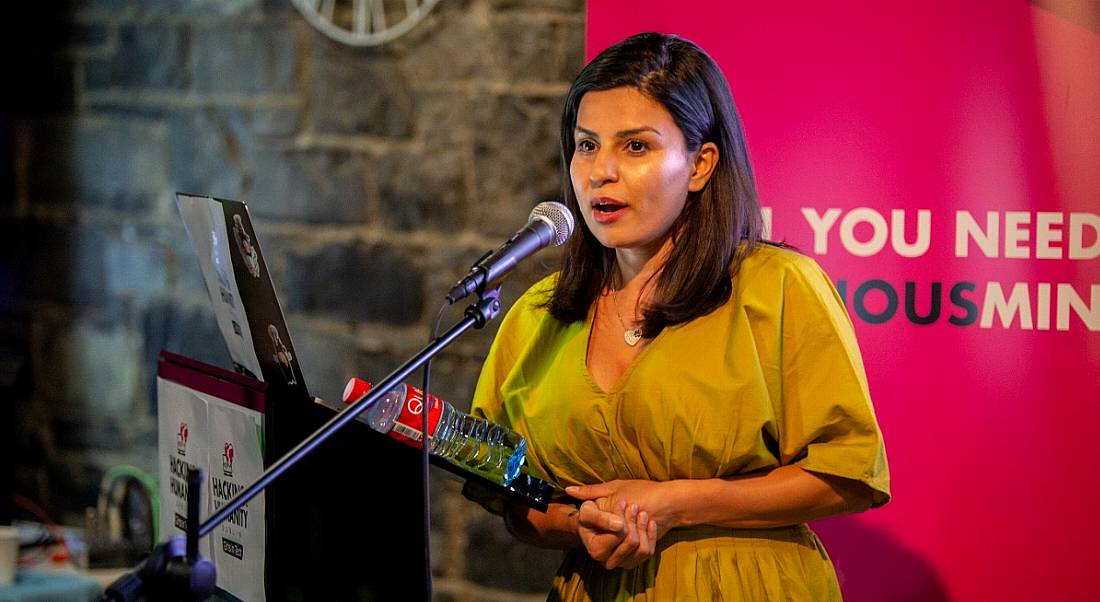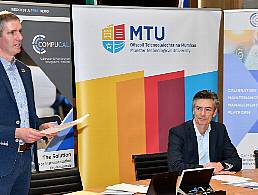Siliconrepublic.com spoke to the managing director of Girls in Tech Dublin about quality mentorship and how she’s working to demystify it.
There’s a litany of buzzwords linked to career success and productivity and, at this stage, ‘mentorship’ is an old kid on the block.
It can feel like one of those terms we hear so much that it becomes almost devoid of a clear meaning, appearing instead as just another arbitrary item on the ever-growing career to-do list.
This is particularly true for women, according to managing director of Girls in Tech Dublin, Coral Movasseli.
“Mentorship has been bombarded on women. You’re just bombarded with all these messages of all the things you need to do. And one of them is also to find a mentor. And so, these messages get lost and are not clearly communicated,” she said.
‘I’m a woman in technology and I’m a female entrepreneur and I understand the challenges for both’
– CORAL MOVASSELI
Girls in Tech
What constitutes a mentor? What makes mentorship something official? Will you be on the back foot in your career without one?
These are just some of the many questions around the concept of mentorship and it can be challenging to find the right answer. Movasseli wants to change that.
Girls in Tech is a global initiative, headquartered in San Francisco, but is present in over 50 cities and on every continent.
Moving to Ireland from Toronto, Movasseli launched the Irish branch of the not-for-profit three years ago, wanting to build something based on her values, her expertise and her own experiences.
Her background in technology and start-up consulting gave her the technical skills to get started, but it was her passion for human rights and equality that motivated Movasseli to set up Girls in Tech in Dublin.
“I’m a woman in technology and I’m a female entrepreneur and I understand the challenges for both,” she told Siliconrepublic.com.
“And I thought, ‘Why don’t I create something where I can promote those two things and I can help other people?’ So, this was something that I created that was very personal.”
Want to get into tech? meet people with influence? Network? Well then, join us on Sept 5th for our next Stepping Up mentorship program!
Register here: https://t.co/vcBXlq8Lns
#steppingup #gitdublin pic.twitter.com/sxPUu4bC2f— Girls in Tech Dublin (@GITDublin) July 18, 2019
Product development is another facet of Movasseli’s background. It was this, she said, that inspired her to adapt the global Girls in Tech programme to the needs of the Irish market.
“Ireland’s a very different place to the US and I thought, ‘I want to I want to create something that works here’. So throughout eight months I ran workshops, talked to a lot of prospective members, and worked with our teams to try to design a programme that suited the women here.
“And what we came up with was the Stepping Up mentorship programme.”
‘Stepping Up’ to the needs of Ireland
The focus on mentorship was born out of Movasseli’s personal career journey.
“I had found it challenging being in a new country and not knowing a lot of people. When I was going through certain challenges, I didn’t know who to turn to.
“It’s great to turn to your life partner but I think you need a whole suite of advisers around you. And I didn’t feel like I had that even though I probably have the level of influence to get access to a lot of people.
“And I thought, ‘Well if I’m having this struggle I’m sure other women are, so why don’t I create a programme that can address that challenge?’”
The programme firstly strives to demystify the idea of mentorship. In Movasseli’s own words, it’s about telling people: “It’s not artificial. You can’t just call someone your mentor if you don’t have the right relationship or the right trust with them. At its core, it’s people you trust.
“And from a professional perspective, it’s people who are going to back you, who are going to support you and who also have the experience and wisdom to guide you. And I think that’s very difficult to find.”
With that knowledge, Movasseli developed the Stepping Up programme further to create a space where navigation tools for mentorship could be imparted.
She said it’s important to advise on what to look for in a mentor, how to structure the relationship and what boundaries to set, but it should also be tailored.
“I don’t like the tactical solutions of just throwing people mentors, of matchmaking them using some algorithms. That doesn’t work for dating, so why would it work for this? This is not a one-size-fits-all kind of thing.”
Diversity and inclusion
Movasseli’s efforts are primarily aimed at women but she still prioritises diversity at her events. Though attendance is typically mostly female, male mentors and mentees are also welcome, as is anyone over the age of 18.
“I think one of the messages that we’re constantly bombarded with is this idea that this is a man versus female thing. And it’s not.”
Ultimately, Movasseli made the point that, in an ideal world, there wouldn’t be a need for initiatives like Girls in Tech and the Stepping Up programme. But so far, the people of Ireland have welcomed Girls in Tech with open arms.
“I think the support that we’ve gotten from the people in Ireland, especially the women, has just been so warm, so receptive and so welcoming.”
Fittingly, it was an Irish woman that Movasseli cited as influential in her own understanding of mentorship.
“One person who gave me a really good perspective on it was Nicola McClafferty from Draper Esprit, the venture capital fund here.
“And she told me to think of it as if you’re your own company and every company needs a board of advisors. All those advisors on your board have different backgrounds, different skillsets, different ages and different profiles.
“That’s how you should think about mentorship. You bring those eclectic people around you. And they grow with you and they learn from you as well.”
Where does mentorship start?
Movasseli offered some insights into what to bear in mind if you’re thinking about seeking out a mentor.
“Don’t put filters on. Don’t go and pick someone with a certain title, with a certain profile and a certain industry.
“Find people from different areas, different industries, different backgrounds. You want diverse perspectives and people to challenge you in a different way.
“Attach yourself to genuinely good people who are not there for some ego drive or because they want to be called a mentor so they can say that in front of their boss.
“Find people who are genuinely interested and give back, who believe in you, want to get to know you and won’t judge you.”
‘We are more powerful together as a group of women than we are fragmented and divided’
– CORAL MOVASSELI
As for those contemplating taking on the role of a mentor, Movasseli said that it’s a serious responsibility to consider.
“It’s not a superficial game. Being a mentor is a big responsibility. You’re getting to know someone, you have to be genuine and authentic about it.
“If you’re not interested in getting to know other people, helping other people and paying it forward, don’t do it.”
Women helping women in tech
Movasseli has based Girls in Tech Dublin and her mentorship programme around equality, diversity, and support.
“I think we need to recognise that there are certain advantages that, as women, are not afforded to us,” she said.
“But it’s not about sitting there complaining. It’s about saying, ‘Hey, let’s do something about it and let’s do it together’.
“We are more powerful together as a group of women than we are fragmented and divided. And if we continue to pay it forward together and to help each other, we’ve already won.”
Attendees at a Stepping Up event in Huckletree D2. Image: Girls in Tech.




